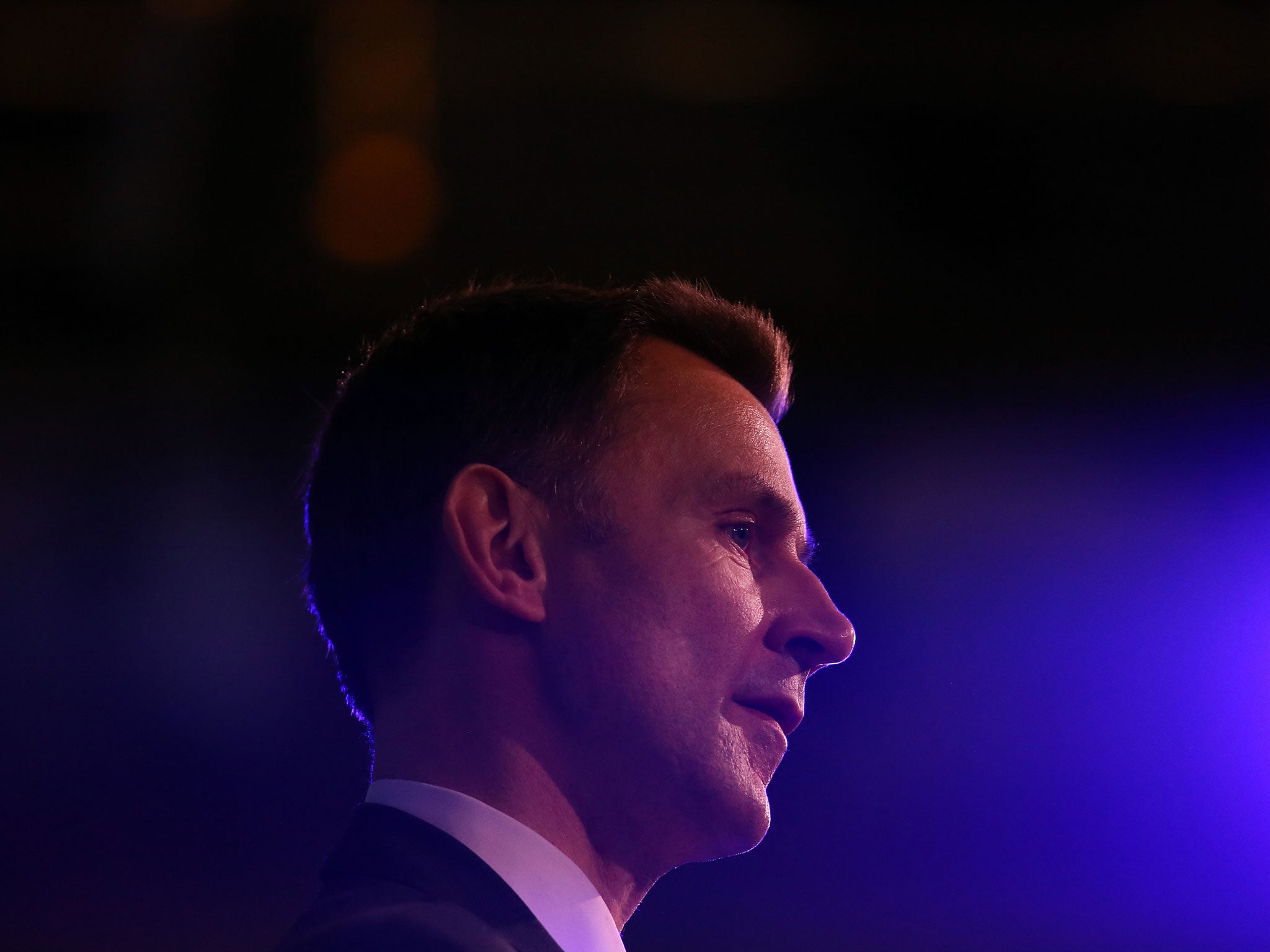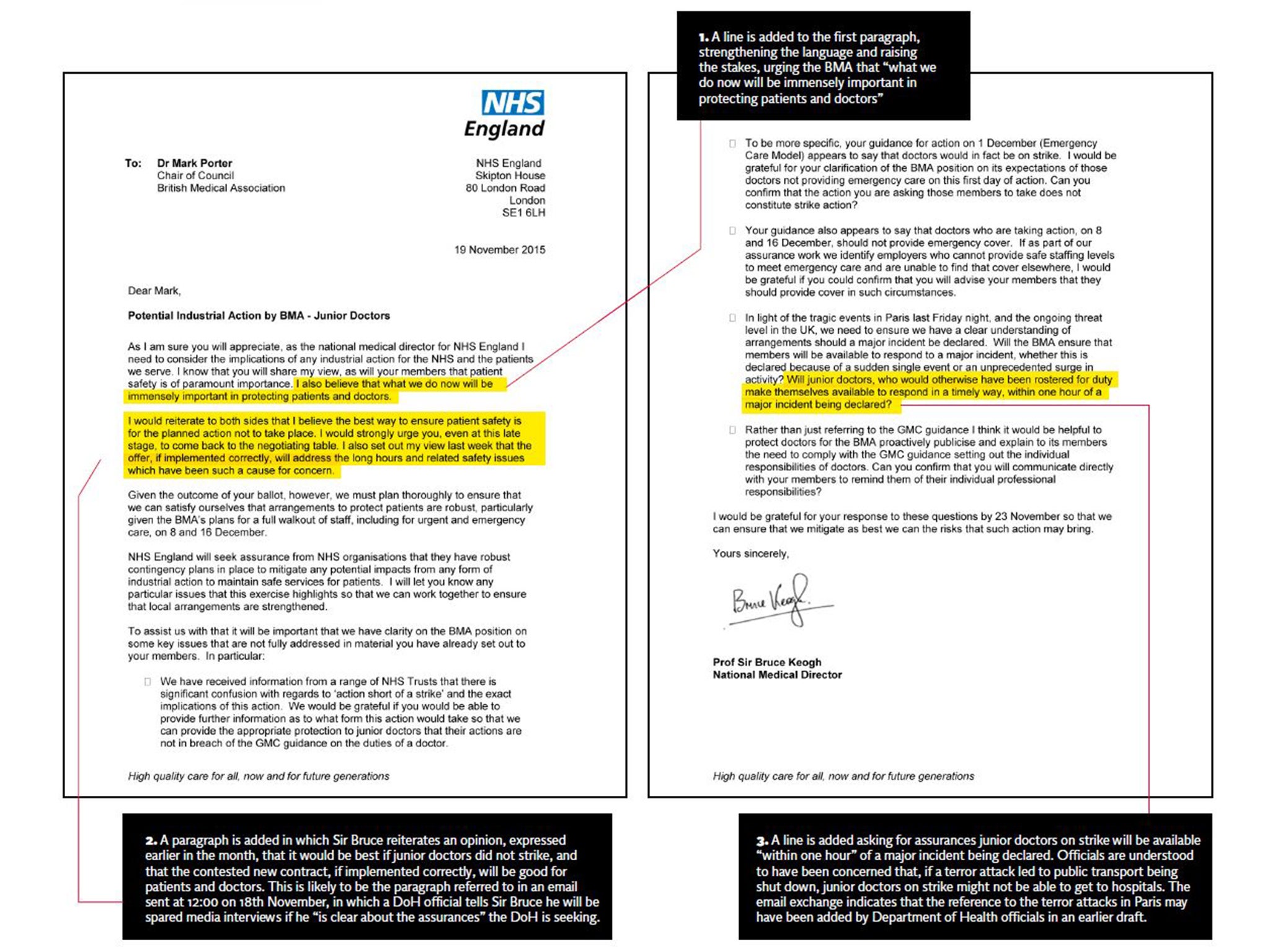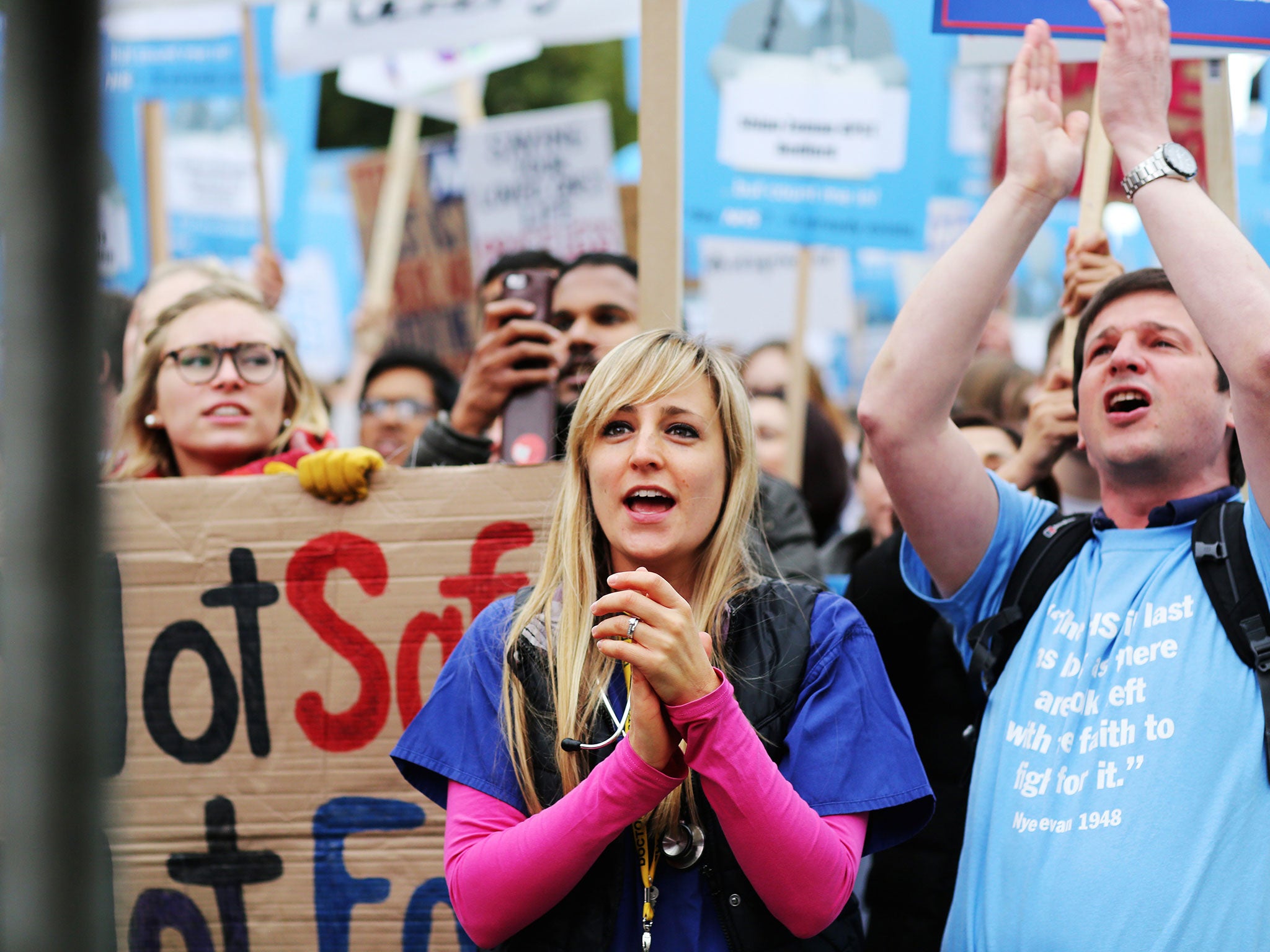Junior doctors: Whitehall edited letter from 'independent' medic to build 'hard-edged' case against strike
Exclusive: Controversial letter in aftermath of Paris attacks was accused of using terror fears for 'political purposes'

Your support helps us to tell the story
From reproductive rights to climate change to Big Tech, The Independent is on the ground when the story is developing. Whether it's investigating the financials of Elon Musk's pro-Trump PAC or producing our latest documentary, 'The A Word', which shines a light on the American women fighting for reproductive rights, we know how important it is to parse out the facts from the messaging.
At such a critical moment in US history, we need reporters on the ground. Your donation allows us to keep sending journalists to speak to both sides of the story.
The Independent is trusted by Americans across the entire political spectrum. And unlike many other quality news outlets, we choose not to lock Americans out of our reporting and analysis with paywalls. We believe quality journalism should be available to everyone, paid for by those who can afford it.
Your support makes all the difference.A controversial letter by the NHS’s top “independent” medic, questioning whether striking junior doctors would be available to help in the event of a Paris-style terror attack, was strengthened and signed off by Whitehall officials, it can be revealed.
Emails between senior Department of Health (DoH) staff and Professor Sir Bruce Keogh, the Medical Director of the independent body NHS England, reveal that Jeremy Hunt, the Health Secretary, was given approval on the text of the letter. It went through a number of revisions, seen by The Independent, to ensure concerns about the possible impact of a major incident during the strike were made as “hard-edged” as possible.
Sent, and made public, in the week after the Paris terror attacks in November last year, the letter caused a storm of protest from junior doctors.
Three thousand medics wrote to Sir Bruce accusing him of using fears of a terror attack for “political purposes”. They said any insinuation that striking doctors would not come back to work in the event of an attack was “not in keeping with the inherent duty that junior doctors have to serve the public”.
The disclosure of how the final text was negotiated will anger them still more.
In one email, sent the day before the strike was declared, Sir Bruce was told by a DoH official that the risk of a “major incident” would be “pressed quite hard in the media once the strike is formally announced” and he was advised that “the more hard-edged you can be on this, the better”.

The emails also reveal that Mr Hunt agreed Sir Bruce would not be asked to speak to the media on the day the strike was declared “so long as” his letter reiterated his opposition to strike action, and was “clear” about the assurances the Department of Health wanted to hear from the BMA.
Asked to confirm he was “happy” with changes to the letter the day before the BMA declared a strike, Sir Bruce was told by an unnamed official: “I am sure then that JH [Jeremy Hunt] will be interested to see the proposed final product; my hope is that if you are happy to make these changes we will be able to get him over the line.”
The heavily redacted emails show that Department of Health officials had close involvement with the letter – even down to the timing of its publication online, on 19 November, the day the BMA revealed junior doctors had voted 98 per cent in favour of strike action.
Responding to the release of the emails, Sir Bruce said that it was “entirely appropriate” that the NHS, the Department of Health and hospitals had “co-ordinated the operational response” to the strike threat.
A DoH spokesman insisted it was “completely right that the Department expressed a view on communication with the BMA”.
Department of Health officials are understood to have been concerned that, in the event of an attack, and a consequent shutdown of public transport, doctors may not have been able to return to work. An email from a DoH official to Sir Bruce, sent on the evening of 18 November, states that “ministerial views here are, if anything, hardening on the major incident point in the event of public transport being disrupted on one of the full walkout days”.
Sir Bruce’s letter referred to the BMA’s first threatened wave of strike action, which was averted less than 24 hours before it was due to start on 1 December. Since then, talks between the Government and the BMA – facilitated by Acas – have broken down, and three new days of strike action have been declared, with the first due on Tuesday next week.
Although last-ditch talks are to take place tomorrow, senior government sources are convinced that the strike will go ahead. The dispute centres on the Government’s new contract offer to junior doctors, which will cut pay for out-of-hours work, to make it easier for hospitals to roster junior doctors at the weekend, as part of the Government’s “seven-day NHS” pledge. In return, doctors will get an 11 per cent basic pay rise.
The new contract would also remove financial penalties for NHS trusts that work doctors beyond their contracted hours.
The Government made a new offer earlier this week, with a new system of safeguards, but this was rejected by junior doctors, who say that the contract will lead to them working longer hours, for less money. The Government has not backed up the new contract with any extra funding for junior doctors’ pay.
The BMA has condemned what it said was evidence of “political interference” with Sir Bruce’s letter.
A spokesperson for the union said: “This level of political interference is extremely concerning and will only serve to worsen junior doctor’s lack of trust in the Government’s handling of negotiations.”
In response, Sir Bruce said: “Given the seriousness of potential industrial action and NHS England’s statutory responsibilities to ensure everything possible is being done to reduce all potential risk, it was entirely appropriate that all parts of the NHS – including the Department of Health, hospitals and NHS England – co-ordinated the operational response across the country.”

A DoH spokesman said: “Industrial action of the kind planned by the BMA creates a major safety risk for patients so it was absolutely right that ministers insisted on Sir Bruce Keogh giving his independent view of the NHS’s capacity to respond in the event of a major terrorist incident.
“Given it is the Government’s ultimate responsibility to do everything it can to ensure public safety, it is completely right that the Department expressed a view on communication with the BMA.”
Emails between Health Department and NHS England
• 18:18, 17 November :I have had a chat with [redacted] is clear that SoS [Jeremy Hunt’s] expectation is that this letter [to BMJ about junior doctors’ strike] should be included in tomorrow’s COBR [Government’s emergency committee] papers and not sent till Thursday. Could you please put it in the papers? Bruce
• 09:24, 18 November [DoH to Keogh with a re-worded version of the letter]. Bruce, Good to speak earlier this morning. As promised, I have woven the points from my earlier email this morning into your letter…
• 10:10 [Sir Bruce writes back] Thanks for your help. Please may I leave it to you and [redacted] team to refine the letter. I am pretty tied up today in Manchester.
• 12:00 [DoH official to Sir Bruce] Bruce, [redacted] and I have just had a conversation with SoS about JD [junior doctor] issues. The good news is that we have agreed with SoS that we should not ask you to take media bids tomorrow, so long as:
- 1) Your letter is clear about the assurances we are seeking, and asks these in a way that ensures that we get a clear answer on the BMA position and
- 2) The letter sets out your view (as you said publicly last week) on the contract and industrial action. To achieve that I have made some further suggested changes to the letter, attached, [and] have inserted a new paragraph setting out the view you expressed last week. I have also tweaked a couple of bullets on assurances to provoke a clearer response from the BMA. Could you let me know if you are happy with the changes. I am sure then that JH will be interested to see the proposed final product; my hope is that if you are happy to make these changes we will be able to get him over the line.
• 12:21 [Apparently from NHS England offical to DoH] Thanks for this. I’m happy with the proposed changes you suggest and I don’t think it goes further than Bruce would be comfortable. I know Bruce is tied up for most of today but I’m happy for this version to be shared with SoS.
• 18:08 [From DoH to NHS England] As discussed, I think you are aiming to agree the “BMA” point and offer some words on the specific assurances with regard to a major incident. Grateful if you could run those past me as you agree them with Bruce as we obviously need to get all that agreed between us tonight (I should add that Ministerial views here are, if anything, hardening on the major incident point in the event of public transport also being disrupted on one of the full walkout days; and they also expect that to be something that will be pressed quite hard in the media once the strike is formally announced. So the more hard-edged on this you can be, the better).
Join our commenting forum
Join thought-provoking conversations, follow other Independent readers and see their replies
Comments